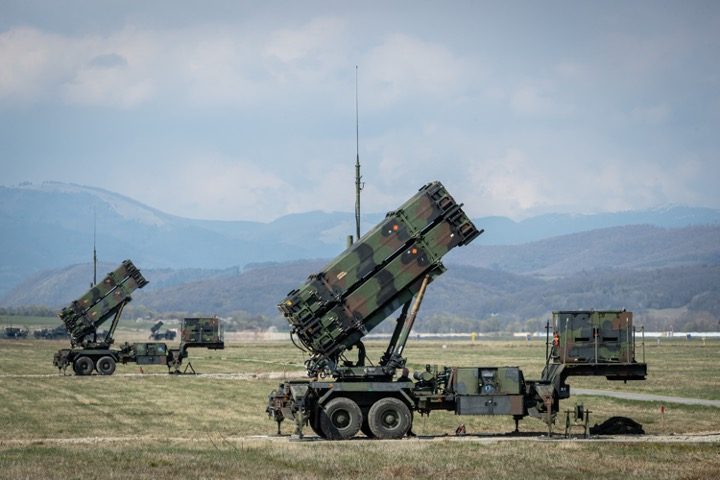
On April 9, German Foreign Minister Annalena Baerbock conceded that while Ukraine desperately needs more air defense missiles, Berlin’s supply of Patriot missiles has been depleted. “Unfortunately, the stocks, especially our own Patriot systems, are now pretty much exhausted,” she admitted.
As per the news outlet Ukrinform, Baerbock declared that Kyiv’s Western partners should try to source more air defense systems, both domestically and internationally, and quickly send them to Ukraine.
Therefore, I made it clear at a NATO foreign ministers’ meeting that we need to check the availability of all Patriot systems in Europe and globally, and that we will make every effort to obtain these systems for Ukraine.
Berlin, along with Ukraine, the EU, and its NATO allies, should address the issue of depleted Patriot systems, and explore the notion of transferring these systems via third countries to Kyiv as soon as possible, the German minister said.
She added that a fund was being worked on with Ukraine and European partners to buy air defense systems from other countries around the world to quickly deliver them to Ukraine, noting that further information could be provided at the meeting of G7 foreign ministers in Italy next week.
Officially, Germany has deployed two batteries of the U.S.-made Patriot systems to Ukraine. Late last month, the German government announced that it was getting additional systems ready for delivery, without providing details as to their number.
According to European news site DPA, Baerbock claimed that Russian President Vladimir Putin hopes to “bomb Kharkiv to the ground.”
“He wants to destroy, he wants to deliberately destroy. If Russia launches a major offensive there, it would cause immeasurable suffering,” she said.
Pro-Ukraine U.K. news outlet The Times claimed that the civilian population of Kharkiv has had to experience “daily missile strikes and drone attacks,” with eight people killed and 10 wounded when missiles “struck residential buildings and a petrol station to the northeast of the city” on April 6.
Another establishment news outlet, The Economist, claimed that Russia plans to make Kharkiv a “gray zone,” meaning an area that is uninhabitable to civilians.
Kharkiv’s Mayor Ihor Terekhov on Telegram claimed that three of those killed in the supposed Russian strikes were rescue workers who died in a “double strike” on a residential building after they arrived to assist the injured.
Meanwhile, Ukrainian leader Volodymyr Zelensky told German news outlet Bild that while Ukraine has come up with a plan for a new counteroffensive, modern weapons are necessary for such a campaign to be carried out.
“Russia has more men, more weapons. But the West has modern weapons systems,” Zelensky declared. “If we get [production] licenses from our partners, then it’s not about the number of people. It’s about the quality of the weapons…. But that also requires weapons. Also from the USA.”
He added that he does not plan to sit down at the negotiating table with Putin, nor concede any part of Ukraine to the Kremlin.
“We are dealing with Putin here,” Zelensky said, “Everything he has said so far — after that, he acted differently. We can’t trust him.”
The Zelensky regime insists that it cannot negotiate with Russia as long as Putin is at the helm, and that it would accept as the outcome of Kyiv’s conflict with Moscow only the complete restoration of Ukraine’s pre-2014 borders.
Officially at least, Zelensky’s intransigent stance regarding Russo-Ukrainian peace talks clearly contrasts with that of Putin’s. In March this year, Putin disclosed in an interview with journalist Dmitry Kiselyov that Russia was open for meaningful peace talks with Ukraine that would offer security guarantees for the former.
“Are we ready for negotiations? Yes, we are ready, but we are only ready for serious negotiations, not those based on wish-lists conjured up after the use of psychotropic drugs, but based on … the realities,” Putin said.
He added:
We are, however, ready for a serious conversation, and we want to resolve all conflicts, especially this conflict, through peaceful means. But we must clearly understand that this is not a pause that the enemy wants to take for rearmament, but this is a serious conversation with security guarantees for the Russian Federation.
On April 10, in efforts to replenish depleted Ukrainian troops for Kyiv’s combat against Moscow, the Ukrainian parliament, Verkhovna Rada, pushed forward with a proposal to allow the draft of certain categories of convicted criminals. Those convicts who enlist in the army may have their sentences reduced or commuted.
With no votes in opposition and 281 in favor, proposal 11079-1 glided through the Ukrainian parliament during the first reading, as per lawmaker Yaroslav Zheleznyak’s claims on his Telegram channel.
Another bill detailing hefty fines for citizens who do not adhere to mobilization rules was also passed at the first reading, according to a report by Reuters.
It remains unclear as to the number of extra personnel who would qualify for the military if the above steps eventually become law.
Last year, Ukraine tried staging a counteroffensive, with Western-trained and armed troops poised to overcome Russian defensive lines and obtain a major triumph. Nevertheless, Ukrainian troops only obtained mediocre territorial gains amid the deaths of tens of thousands of soldiers and dwindling arms stockpiles. According to Russian estimates, Ukrainian military losses between early June and late October 2023 were around 90,000 troops, 600 tanks, and 1,900 other armored vehicles.
On April 8, The New Yorker published a deep analysis about the frontline realities of the Russo-Ukrainian conflict, as per observations gathered by reporter Luke Mogelson while embedded in a Ukrainian unit in January. The report claimed that Ukrainian frontline casualties are far higher than the country’s leadership is willing to acknowledge. In early February, various commanders admitted to reporters that their units were already functioning at 35-percent strength or less.



